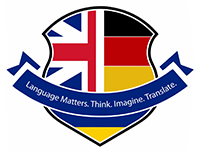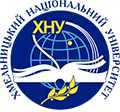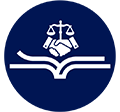
Sophomore students of the Germanic Languages and Translation Studies Department taking course ‘Terminology’ had a great opportunity to meet peers from all over Europe and participate in virtual translation student fair as one of Translating Europe Workshops on May 3, 9 to 5 (CET), on the platform wonder.me.
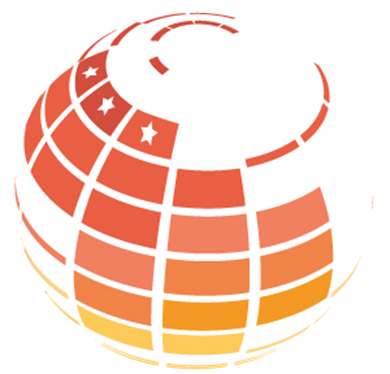
Programme: https://tinyurl.com/2smxrx4c
Translating Europe Workshops (TEW) are organized by Directorate-General for Translation representatives in the EU Member States, often in cooperation with universities of the European Master’s in Translation. Translating Europe project has been created to bring together translation stakeholders in Europe. Launched in 2014, the “Translating Europe” project brings together translation stakeholders, such as universities, the language industry, national language institutes, translation services of the public sector (or authorities) in the Member States and professional associations.

Olga Uspenska, a sophomore student: On 3 May I attended the Translation Student Fair and participated in three conferences.
The first workshop was at 10.15 and was called “Getting started as a translator”. An interview with Sandra Mouton (FIT Europe, Freelance Translator) and Joss Moorkens (Dublin City University). They gave the students several recommendations, the main ones being to be interested and not to stop learning, to join a professional association from the very beginning (to have contacts with other translators and clients, especially if you work from home (general networking)), to attend different conferences, which might not even be related to translation, to do extra tasks to develop and just be patient. Sandra and Joss also told us that you have to choose one CAT tool and know how to work with it and be professional with it in order to be able to compare with other CAT tools. They also talked about the privileges of being in a professional association and that it is important to participate in several ones (one must be related to the mother tongue and the other to the language you are translating into).
The next workshop at 11.15 “Specializing as a translator” by Lucio Bagnulo (Amnesty International) was about the importance of investing in yourself from the beginning. The most interesting thing was that it is okay to change one’s mind about being a translator. The knowledge that you’ve got can be applied everywhere (e.g. content writer)! He recommends reading a lot and first of all reading in native language so as to know it thoroughly. It is also important to be adaptable (flexible) and curious.
And finally the 3rd workshop at 12.30 p.m. called “Professional use of social media by translators” by Rudy Loock was about the importance of controlling your social media. It is important to be hygienic in social media and be a real professional when managing accounts.
It was a pleasure to participate in the workshops!
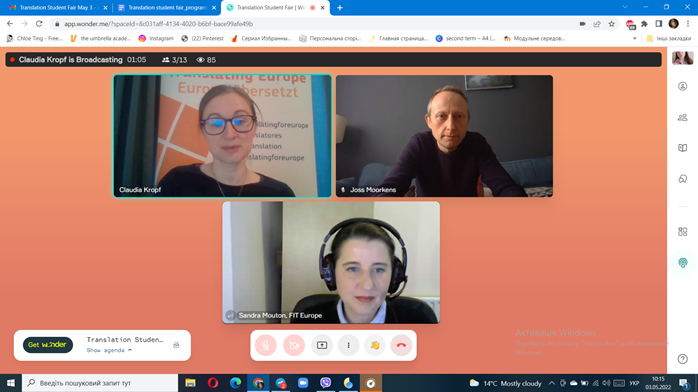
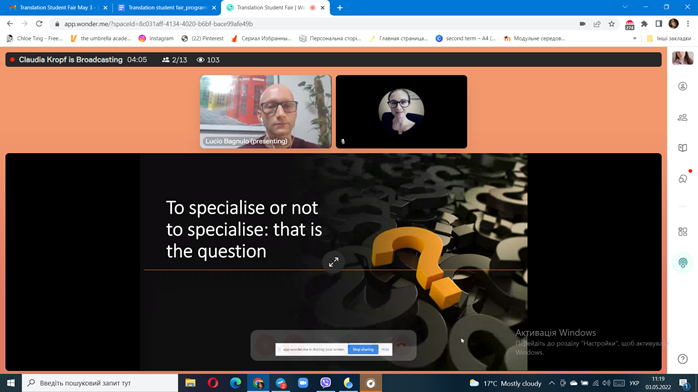

Oleksandra Semianiv, a sophomore student: The first session of TRANSLATION STUDENT FAIR was titled GETTING STARTED AS A TRANSLATOR. It took the form of an interview with Sandra Mouton and Joss Moorkens. First of all, I would like to admit how pleasant the speakers’ speech was, it was extremely interesting to listen to their conversation. Sandra Mouton has a really great experience in the field of translation. Therefore, it was an honor to hear what an ordinary freelancer’s day consists of. Joss Moorkens talked about his work month. But still, the most interesting thing for me was how Sandra described her day. She said everything very honestly, considering even the difficulties that a freelancer may face even at home. Jossie gave real life advice, which is also about professionalism, it is to establish contacts with people, to be in pleasant relations with your colleagues, because this is an important thing that surrounds you every day.
The topic of the next session was SPECIALISING AS A TRANSLATOR. The speaker Lucio Bagnulo was also very pleased to listen. He gave important advice to me and I really liked it. The main topic that Lucio raised was how to choose one or more specializations. I liked his phrase: «Many people think that getting a degree is the end of their studies, but this is just the beginning». She inspired me to work on myself even more. Well, he advised me to focus on what I like, that is, to use my hobby as a specialization, because Lucio said that even if the work is paid, but not satisfying, it’s very bad. In addition, a few more clear rules: it is important to be able to use translation technologies, such as CAT tools. I need to use the right websites and join professional translation organizations.
I must mention the session PROFESSIONAL USE OF SOCIAL MEDIA BY TRANSLATORS, because this session was the most interesting, most active and most useful for me. Extremely interesting topic was perfectly told by the speaker Rudy Loock. In my opinion, this topic is the most relevant today, because we spend a lot of time on social networks and you need to be able to use them properly for yourself if you are a translator. The most important thing I took for myself is that even in social networks you should have an e-reputation (reputation on the web). You need this reputation to be trusted, so you need to build it already, even if you are a student. After all, this is a time of more than one day, more than one week, this is a very long process. There is also a lot of competition now, so you need to run social networks properly and follow the right people. If I don’t follow these rules, I will never be able to find a good job. Rudy showed specific organizations that need to be followed on Twitter, as well as specific people that are useful to follow if you are a translator. Importantly, he follows these people himself. Again, these tips have been the best for me.
Well, the last session: Terminology work at the language service of the German Bundeswehr, with Beate Kuhl. The speaker talked about his work at the Federal Office of Languages. So it was interesting to hear how this organization works.
Dana Taraban, a sophomore student: I had a great time at the Translation Student Fair, and I enjoyed attending the conference “Getting started as a translator”. Sandra Mounton and Joss Moorkens were both excellent presenters who kept us engaged throughout the meeting. I was never bored during the interview, and whenever I was about to become distracted, Sandra and Joss drew my focus back with a prompt. They discussed theories and real-life examples of how to improve your skills as a freelance translator. From start to finish, it was immersing. The interview was not only straightforward to follow, but it also offered time for reflection on the facts presented. I picked up a lot of helpful hints on how to better my studies to become a translator. In conclusion, I would like to say that the information gained from the interview was quite beneficial. The presenters were knowledgeable and provided useful advice. Wonder was a fantastic platform to work with. Thanks for an unforgettable experience!
Olga Loburenko, a sophomore student: Two interviewers provided insights and some tips for students in the field of translation. One of them was Joss Moorkens, a professor at Dublin City University. His inspiration to become a translator was a friend that he used to play drums with and he was a song-writer. Joss received a faculty position 6 years ago. He is engaged
in back translation technology, machine translation, different tools, he looks after masters dissertation. He gives a formula for success in the field of translation: research skills+motivation+curiosity. Another interviewer was Sandra Mouton, a member of FIT EUROPE. She was a French teacher for 5 years and then changed her profession to translator. She describes her working day as follows: browsing social networks, reading urgent emails, translating documents for 2-3 hours, lunch break, taking a nap or doing less
intense tasks, proofreading. She explains that the translator’s work combines the work of an editor, translator, admin person, IT person, marketing person. She is a member of FIT EUROPE. Being a member of this organization has many benefits. You will receive a lot of support, training, it will help you to launch your career. It is a great opportunity to meet people, because at start of your career you will be isolated at home, you will be listed on the site, where clients can find you and order your work. You will get regular networking opportunities in person. I also listened to Lucio Bagnulo. He explains how to choose one or more specialization. You need to start by focusing on one field of studying. You need to take into account the needs of the market, what fields are in trend and profitable. He explains that a person must be flexible to adopt to different fields. The main insight I made for myself: “transform your hobby in the field of your specialization”.
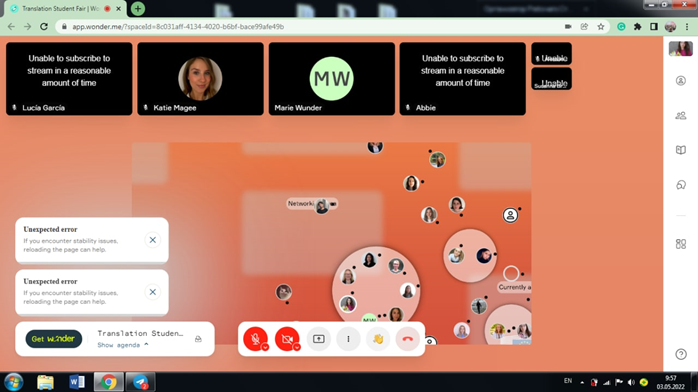
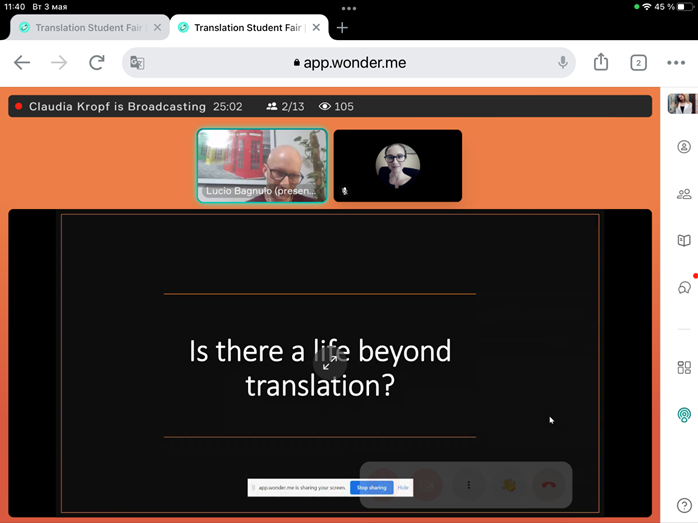
Yulia Gorgulko, a sophomore student: Today I attended morning and afternoon sessions of the Translation Student Fair. They were very interesting and informative. In the morning sessions the topic of freelance was mostly discussed. In an interview Sandra Mouton and Joss Moorkens gave useful advice. Sandra stated that It is very important to separate work from life while freelancing and working from home, otherwise you’ll have no life. Joss said that nowadays translators need to know how to use CAT tools and how important it is to keep up to date with new technologies. Both of them gave top 3 tips for translating/freelancing. Joss said that you need to know how to write and communicate well, be curious and motivated; Sandra told about the importance of engaging with the business world and marketing etc from the beginning of your career, holding your head high and taking pride in your work and also cherishing freedom of saying no. Lucio Bagnuio talked about choosing your specialization and not regretting it afterwards. Rudy Loock talked about professional use of social media for translators and about the importance of keeping your image professional. In the afternoon sessions speakers told us about terminology work. Beate Kuhl gave a presentation about the language service of the German Bundeswehr and talked about her experience working at the Federal Office of languages. Sarah Melzer showed us how to get terminology organized and gave some useful tips and tricks. To sum up, these sessions were very useful, I got to hear many interesting people and learn plenty of new things.
Iryna Zelinska, a sophomore student: The translation fair has just ended. I would like to share my impressions. So, there were different speakers at the fair. They told us about translation, the work of translators and interpreters and various translation tools. From my point of view, the speakers represented a lot of useful information, I was especially interested in additional translation tools, CAT-tools. The speakers advised to keep up to date with general technology news and not only. Then we were listening to the speaker Sarah by name who were talking about terminological work and termabases. Everything was interesting, useful and positive. It was worth my time.
Anna Vozniuk, a sophomore student: Today’s conference was a success! Thanks to the organizers and my teacher, I had a great time! Our session began with a greeting from the organizer and a discussion of the plan for our work. Step by step, we met with different speakers and listened to their interviews. From this part of the conference, I learned about good habits that will help me become a successful professional in the future. For example, how to stay motivated and how to improve skills. The speakers paid attention to the programs that will help in translation. They recommended several of them, telling about pros and cons. The speakers once again reminded us that machine translation is not reliable. I heard some very good advice from one of the speakers. The man said that it is very important to develop the native language. It will help you express yourself better and look for equivalents among other languages. I think this is one of the best remarks at this conference! We also talked a little bit about mass media in the field of translation. A speaker named Rudy Loock told us what kind of social media translators use. It turns out that there are several types, from “official” (Facebook, e.g.) to “mediocre” (Instagram and YouTube). By the way, the speaker said that we should be careful about what we post online because “the Internet remembers everything,” and being a successful translator, someone can “spoil our reputation with a bad picture from a party” =) So, toward the end, we moved on to the topic of terminology. I should have paid more attention to this part of the conference, because Sarah was telling us about the details of terminology organization, while I was thinking about something else. Unfortunately, Sarah was absent for most of her time due to the poor quality of the Internet, and we did not have time to learn all the information we needed. However, I learned that terminology “likes to be organized”. To describe a term in detail, you have to study it. In addition, terms need to be “sorted” by different characteristics for convenience. To summarize, I want to say that I am glad I joined this event. During the break, a woman from America joined me for a chat. She told me that her parents are Ukrainians and she appreciates our country. We had a nice conversation for a few minutes and she wished us all good luck. By the way, she said that the word “koshmar” comes from the French language (this woman knows French well). It was the word her mother used to scare her when she was a child =)


Solomia Savka, a sophomore student: I am very grateful to the University for the opportunity to attend such an interesting event dedicated to the discipline of terminology, which was very educative, and thanks to the fact that all the information was presented by native speakers step-by-step, I’ve learned a lot of new things.
The first event I visited was an interview with Sandra Mouton and Joss Moorkens, a freelance translator and associate professor at the University of Dublin. They shared their experience about their path to become a professional translator and gave us advice for beginners, for example: be realistic, see yourself as a professional translator and try to communicate with people who are connoisseurs in the translation field.
The next event that I participated in was with Lucio Bagnulo, who told us about translation in general and specializing as a translator. He explained to us how to make a good translation of the text and what to do first.
Daria Shakula, a sophomore student: I sincerely thank for the opportunity to be present during the conferences from Universities in the European Masters in Translation network.
During the interview with Sandra Mouton (FIT Europe, Freelance Translator) and Joss Moorkens (Dublin City University), I deepened my knowledge of the benefits of translation networking and overuse of machine translation. They also noted that it is important for a professional translator to be able to use several types of CAT tools. Of course, at the end of the lecture, the translators gave useful advice for a successful translation career. I was impressed by Sandra’s advice. (She is a French translator, working with English, Russian and Latin on marketing, boats, video games and history texts):
- First of all, interaction with the business world and perspective clients. We need to constantly communicate with people and be interested in their opinions on various issues.
- As for freelancers, it is better to have a financial plan in advance, because at first, as a rule, novice translators do not earn much.
- The third piece of advice is to get your head high. And shamelessly say “no” if the job, the salary or the client not good for you. As Sandra Mouton said, everyone should remember: «This is me, I`m a professional translator».
Of course, the information I received will help me in my translation career in the future. It was also very interesting to hear Lucio Bagnulo (Amnesty International). He talked about how to transform your hobby into another type of specialization. Unfortunately, sometimes the work of a translator starts to get boring and there is no inspiration to do it. Moreover, this is normal. At this time, the main thing is to understand that knowledge of languages gives many opportunities and without hesitation we have the opportunity to do something else.
Many thanks to the speakers for the wonderful presentations and lectures, good mood and motivation at the end of each conference. I hope that in the future such conferences will be held regularly.


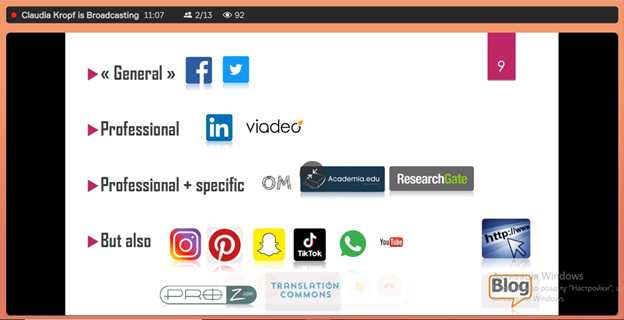
Valeria Huz, a sophomore student: Translation Student Fair is a great opportunity to learn a lot of information from qualified translators. First, there was an interview with Sandra Mounton and Joss Moorkens. However, I remembered Sandra’s information better. She told about FIT Europe. It is the Regional Centre of the International Federation of Translators, focusing on translation and interpreting issues in Europe. In addition, Sandra told about benefits to students of this center. I was very interested in listening to Rudy Loock. His presentation was about social media. He told how to design them correctly, which platform is better to choose and a plenty of other interesting and very useful information. In general, I liked the workshop. I learned a great deal of new information that will definitely come in handy. It was a great experience.
Daria Koval, a sophomore student: At session 1B, the topic of Beate Kuhl`s speech was Terminological work in the Language service of the German Bundeswehr.
Beate has been working there for 15 years and knows exactly what she was talking about. Beate told us about how it was first developed. We also learned the history of the terminological work of the German Bundeswehr. Then she told us about Lexis and technical developments. In general, this speech was useful and interesting.
P.S: We also talked to a Frenchwoman. A very good woman who told us about her experience in Ukraine, but when she heard the word “koshmar”, she said that it was very similar to the French word.

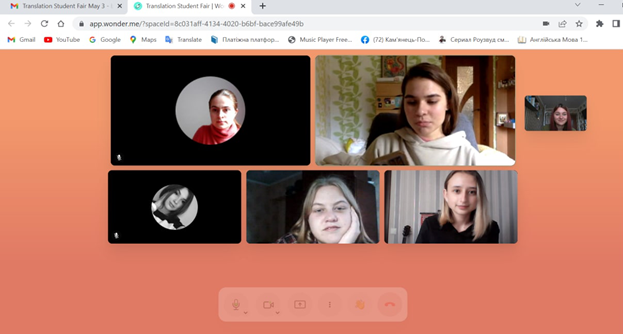

Alona Horbatiuk, a sophomore student: Today I visited the translation student fair. I attended the following sessions: the first session was an interview with freelancer Sandra Mouton and University of Dublin teacher Joss Moorkens. Sandra and Joss shared prospects for translators. They recommended joining different translation associations and attending various training courses. Sandra Mouton and Joss Moorkens highlighted three essential components for successful translators. It is patience, professional skills and motivation. The second session was a conversation with Lucio Bagnulo. Lucio said that the main thing is to know the target language well. You need to constantly improve your knowledge. Translation offers great opportunities. It’s a well-payed job, high career growth. Lucio stressed that it is always necessary to devote a lot of time to work. The next session was Rudy Loock’s talk on the importance of social media for translators. Social media help to find new clients. Rudy gave some advice: to publish professional information, to separate personal information from professional, you need to be active, everyone is responsible for the information he provides. The fourth session was about terminology work at the Language Service. The speaker was Beate Kuhl. Beate Kuhl told the history of terminology work in the Bundeswehr. She listed the tasks. Beate noted the achievements of their work to date. The last session was about tips for successful terminology work. The speaker was Sarah Melzer. She showed different ways to create termbases. Reliable sources are Terminotix, SDL community SDL videos. I liked the session with Sarah Melzer the most. In my opinion, she gave the most important advice. One of the important skills of the translator is the successful creation of a termbase. The fair was organized at a high level, all events were held on schedule.
Olga Bartenieva, a sophomore student: We listened about Terminology work at the Language Service of the German Bundeswehr. Our presenter was Beate Kuhl. She is Assistant chief of branch for the terminology workflow, working at the Federal Office of languages since 2007, M.A. in Technical Communications, degree in translation, currently working in process development for different new tools and workflows, i.e. machine translation and translation management. She is interested in language technology. Her speech was about the Federal Office of Languages, history of terminology work at the Federal Office of Languages and Terminology work today. In general it was really good experience and I am glad to have participated in TRANSLATION STUDENT FAIR.

